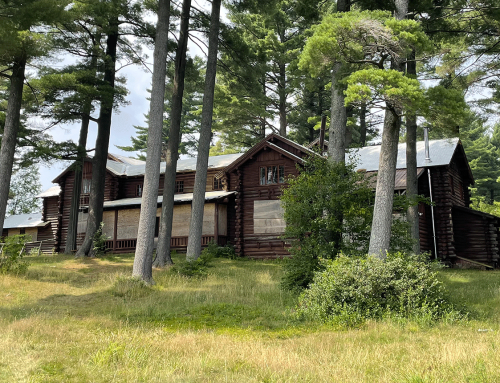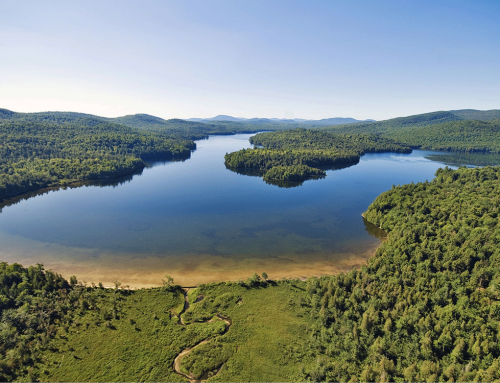New Bill Introduced to Protect Wolves in New York
Senator Brad Hoylman-Sigal and Assembly Member Bobby Carroll introduced legislation to require DEC to collect and analyze data about large canids in New York
New legislation (S.7927A/A.08295A), sponsored by Senator Brad Hoylman-Sigal and Assembly Member Robert Carroll, will direct the NYS Department of Environmental Conservation (DEC) to collect data about canids that have specified characteristics that are killed by hunters and trappers in New York. The data collected will help DEC to identify areas of the state where wolves, a protected endangered species, may be present and will direct DEC to collect important genetic information on coyote and wolf populations in the state. The legislation does not reduce the hunting season or decrease bag limits for hunters and trappers lawfully killing coyotes or other game animals in New York State.
Senator Hoylman-Sigal said: “Wolves are protected as an endangered species under both New York State and Federal law. Despite that, hunters and trappers too often mistake wolves for coyotes, due to their similar appearance, and kill them anyway. In order to ensure these precious creatures do not go extinct, we need to strengthen the protections for wolves under New York State law. We can do that by passing our bill (S.7927A) to require the NYS Department of Environmental Conservation to collect genetic data about large canids killed by hunters and trappers in New York. The data collected will help the Department of Environmental Conservation identify areas of the state where wolves may be present and keep the department, and the public, informed about where more precautions and restrictions are needed to protect these endangered animals.”
“By putting in place measures to identify and account for wolves in New York State this bill, if enacted, will be essential in protecting this endangered species as well as fostering biodiversity and a healthy eco-system,” said Assemblymember Robert Carroll.
The legislation requires hunters and trappers to report to DEC coyotes killed, as required for numerous other species, to collect key information on the characteristics of animals killed, number of animals killed, and location data. Canids that weigh greater than 50 pounds will be subjected to DNA analysis by DEC to determine the genetic ancestry of the animal. If DNA analysis shows that the animal is a wolf, DEC may impose a temporary moratorium on the killing of wild canids in a specific area in order to protect any federally and state protected wolves in the area. DEC will have the discretion to determine the length of time and the location of the moratorium.
DEC will also be required to provide information on wild canids to the public including any DNA test results of wild canids. DEC will also be required to update its hunting and trapping educational materials to provide hunters and trappers with information on the legal status for wolves, and how to distinguish a wolf from a coyote in the field. DEC will also be required to submit a report on the status of wolves in New York State.
Wolves historically inhabited much of the lower 48 United States, but by the early 1900s were extirpated throughout most of their range, including in New York State, due to intentional eradication campaigns. Wolves are ecologically essential for healthy functioning ecosystems, can disperse hundreds of miles, and reestablish territories if sufficient legal protections are in place to allow them safe passage. Over the past few decades, wolves have periodically migrated into New York and neighboring northeastern states from Canada and the Great Lakes. However, due to the similarity in appearance between wolves and large eastern coyotes, these animals have been and will continue to be killed by hunters and trappers in New York. Since wolves are protected as endangered species according to both federal and New York State law, there is a need for specific on-the-ground actions to prevent future killings due to mistaken species identity.
“This legislation will provide improved protections to wolves in New York State and it will develop sound scientific information for the DEC, the public and the Legislature to guide policy and management into the future. This is common-sense legislation to gather important genetic data on wild canids in the State, and to afford wolves a stronger chance to survive and re-establish themselves in their former home territory within New York State,” said Claudia Braymer, Deputy Director, of Protect the Adirondacks.
“As apex predators, wolves help create balance in their ecosystems by eating old, sick, and weak prey. They help keep deer, moose, beaver, and other populations in check, subsequently affecting vegetation growth and diversity. For this reason, they are an important component in establishing and maintaining a biologically diverse ecosystem. Wolves are naturally returning to the Northeast, representing the beginning of a necessary healing of the ecosystem. Legislation aimed at establishing measures to account for wolves in the state, as well as expanding hunter education on canid identification, will be imperative in ensuring that wolves are protected as they return to the region,” said Elizabeth Ahearn, Conservation Associate, Sierra Club Atlantic Chapter.
“Wolves returning to New York could usher in the next great rewilding success story, but not if dispersing wolves are misidentified as coyotes and killed once they set foot within the state,” said Renee Seacor, Project Coyote’s Carnivore Conservation Director. “This bill provides a common sense approach to wolf recovery, by facilitating crucial genetic research to better understand New York’s wild canids, and laying the groundwork for sound science-based management.”
“DEC recognizes all the issues that this bill addresses: that wolves have migrated to New York, are protected under federal and state law, and have mixed genetically with coyotes. The steps that the agency and hunters would need to take are no different than with other wildlife species that require sound management—while also giving wolves a fighting chance for recovery in New York and across the Northeast,” said Nadia Steinzor, Northeast Carnivore Advocate, the Rewilding Institute.
“All canids, including wolves and coyotes, are valued members of healthy ecosystems. Every documented case of wolves in the Northeast since their extirpation is most likely only a fraction of the wolves actually present. By requiring the DNA testing of canids in New York, we’re laying a foundation to better understand and protect the wildlife that call our state home,” said Regan Downey, Director of Education, Wolf Conservation Center.
“This legislation strategically advances New York’s understanding and conservation of its wildlife, in particular its wild canids. The bill helps the NYS Department of Environmental Conservation carry out DEC’s stated goals of distinguishing coyotes from wolves and of advising conservationists and hunters of these distinguishing characteristics. It also materially assists NYS DEC in its legislated mandate to conserve all wild canids and to protect endangered species including wolves,” said Dave Gibson, managing partner, Adirondack Wild: Friends of the Forest Preserve.
“Wolves are already returning to New York and this bill will help ensure their homecoming is that much safer,” said Tala DiBenedetto, a staff attorney at the Center for Biological Diversity. “Protecting wolves by enacting this practical measure is a crucial step for New York but also an excellent model for other states in the Northeast. Wolves once ranged across the entire region and there’s still plenty of good habitat for them to reestablish here.”
For more information, you may contact:
Claudia Braymer, Deputy Director, Protect the Adirondacks 703-937-7163
Renee Seacor, Carnivore Conservation Director, Project Coyote 845-402-0018
Kate Bartholomew, Chair, Chapter Exe. Cte., Sierra Club Atlantic Chapter 607-228-7371
Elizabeth Ahearn, Conservation Associate, Sierra Club Atlantic Chapter 518-426-9144
Dave Gibson, Adirondack Wild: Friends of the Forest Preserve 518-469-4081
Nadia Steinzor, Rewilding Institute 845-417-6505
Tala DiBenedetto, Center for Biological Diversity, 718-874-6734, ext 555
Regan Downey, Wolf Conservation Center 914-763-2373






